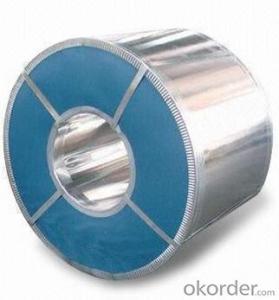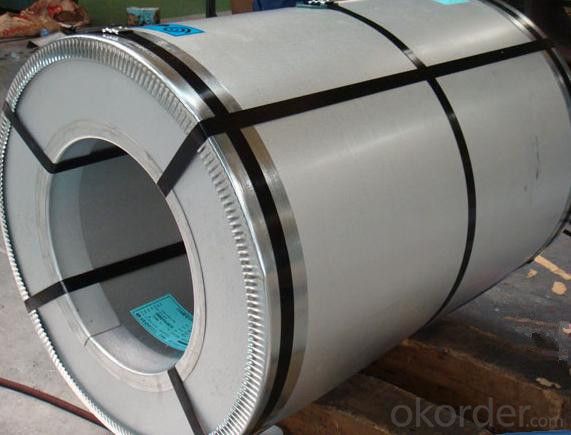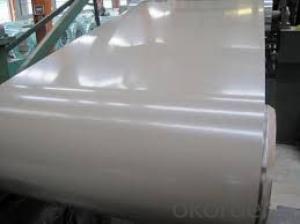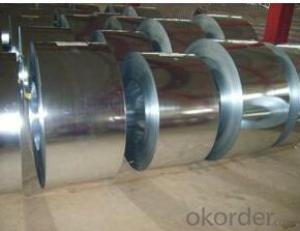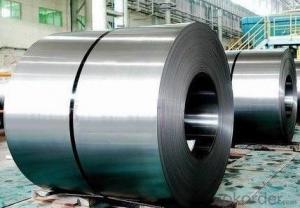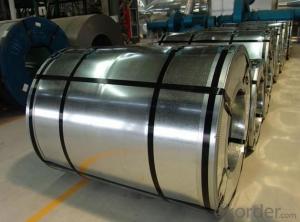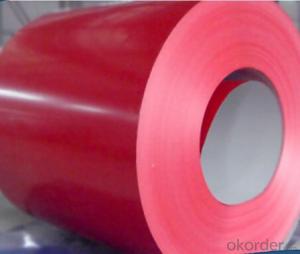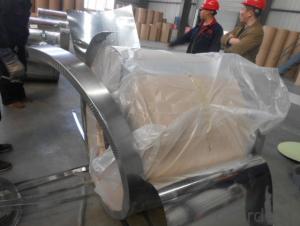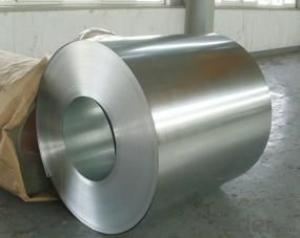Hot Dipped Galvanized Steel (Gi) for Building Materials
- Loading Port:
- Tianjin
- Payment Terms:
- TT OR LC
- Min Order Qty:
- 50 m.t.
- Supply Capability:
- 5000 m.t./month
OKorder Service Pledge
OKorder Financial Service
You Might Also Like
Product Details
Basic Info.
Standard:ASTM, JIS, GB, AISI, BS
Steel Grade:Q195
Certification:SGS
Surface Treatment:Galvanized
Technique:Cold Rolled
Application:Container Plate
Edge:Mill
Stock:Not Stock
Export Markets:Global
Additional Info.
Packing:Coils
Standard:600MM-1250MM
Origin:China
HS Code:72107090
Production Capacity:20000tons
Product Description
Product Description
1. Strong resistance to corrosion, the service life can reach 25years.
2. Superior heat resistance, Galvalume shows no discoloration and oxidation at 315.
3. Fantastic silver color on the surface
4. Excellent heat reflection
5. Simple and easy construction
6. Excellent printability
Major Application:
Widely used in Construction industry, home appliance automobile industry, color coated sheet and industrial instrument etc.
Advantages of Our Galvanized Steel Coil
1) Excellent corrosion resistance: The zinc layer provides a good protection of Pre-painted Galvanizeed Steel Sheet.
2) High heat resistance: The reflective surface of the material aids in efficiently reflecting the sunlight away and in turnreducing the amount of heat transmitted.
The thermal reflectivity converts into energy savings.
3) Aesthetics: Pre-Painted Galvanized steel sheet is available in plethora of patterns and multiple sizes as per the requirements that given by our customers.
4) Versatility: Can be used in the various areas.
Applications of Galvanized Steel Coil
1) Buildings and constructions: Roofing, ceilings, gutters, venting lines, indoor decorations, window frames, etc.
2) Electrical appliances: Computer shells, washing machines, refrigerators, dehumidifiers, video recorders, water heaters, etc.
3) Agricultural equipments: Troughs, feeding tools, agricultural driers, irrigation channels, etc.
4) Vehicle parts: Back-seat plates of buses and trucks, conveying systems, oil tanks, etc.
| Commodity | zinc coated galvanized steel coil and sheet (GI) |
| Techinical Standard: | JIS 3302 / ASTM A653 / EN10143 |
| Grade | DX51D / DX52D/ DX53D/ S250, S280, 320GD |
| Types: | Commercial / Drawing / Deep Drawing / Structural quality |
| Width | 650/726/820/914/1000/1200/1219/1220/1250mm |
| Thickness | 0.12-1.0mm (0.14-0.5mm is the most advantage thickness) |
| Type of coating: | galvanized |
| Zinc coating | Z40-150g/m2 |
| Surface treament | chromed / skinpass/ oiled/slightly oiled/ dry/ anti-fingerprint |
| Surface structure: | zero spangle / minimized spangle / regular spangle/ big regular |
| ID coil | 508mm or 610mm |
| Package: | Properly packed for ocean freight exportation in 20' ' containers |
| Application: | Industrial panels, roofing and siding for painting |
| Price terms | FOB, CFR, CIF |
| Payment terms | 20%TT in advance+80% TT or irrevocable 80%L/C at sight |
| delivery time | 25 days after recepit of 20% TT |
| Remarks | Insurance is all risks |
| MTC 3.1 will be handed on with shipping documents | |
| We accept SGS certificatation test |
Product show:
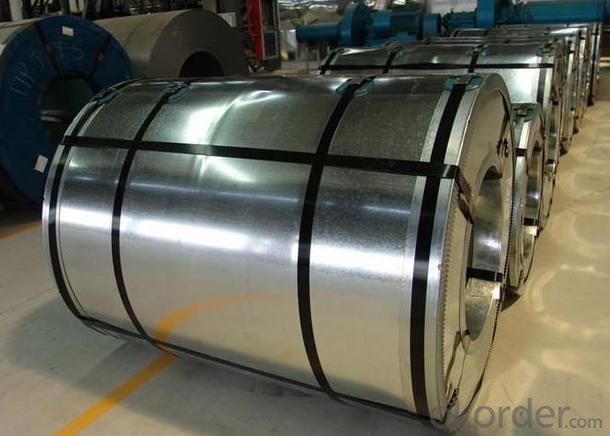
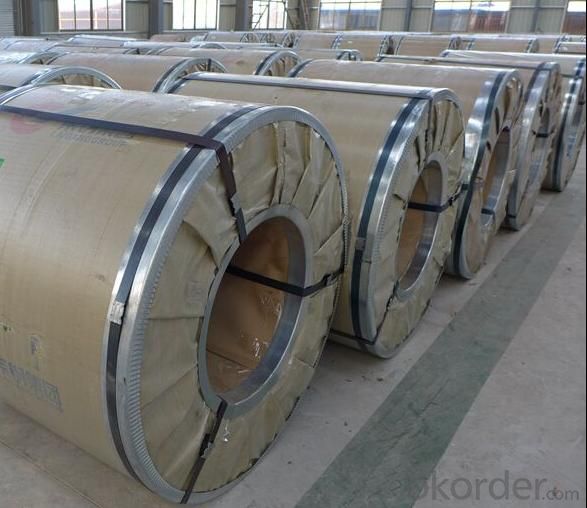
FAQ:
1. What is the minimum order quantity ?
Our MOQ is 50mt for each size. And we will consider to give more discount if you make big order like 1000 tons and more. Further more, the more appropriate payment term your offer the better price we can provide.
2. How long can we receive the product after purchase?
Usually within thirty working days after receiving buyer’s advance payment or LC. We will arrange the factory manufacturing as soon as possible. The cargo readiness usually takes 15-25 days, but the shipment will depend on the vessel situation.
3. How to guarantee the quality of the products?
We have established the international advanced quality management system,every link from raw material to final product we have strict quality test;We resolutely put an end to unqualified products flowing into the market. At the same time, we will provide necessary follow-up service assurance.
4.What is the validity of your quotation?
Normally 7 days.
5.What is your advantage?
24 hour quick response /Customer oriented/ Credit foremost/ Top quality Excellent
- Q: How are steel coils used in the production of aerospace parts?
- Steel coils are used in the production of aerospace parts as they provide a reliable and durable material for manufacturing various components such as engine parts, structural beams, and landing gear. The coils are first processed and shaped into specific forms and sizes, then undergo further fabrication processes like cutting, welding, and machining to create the desired aerospace parts. The high strength and corrosion resistance of steel make it an ideal choice for ensuring the safety and performance of aerospace components.
- Q: This question is directed to anyone who has played or know someone who plays a lap or pedal steel guitar.I've been a guitarist for about 8 years now and have played a variety of styles from rock, fingerstyle/classical, singer/songwriter acoustic stuff, ect, and now I've really had an interest in learning how to play a lap steel or pedal steel guitar. I am completely new to the instrument(s), so I'm seeking all the information I can. I do know that a pedal steel is a lot more expensive, so I'm probably looking to start on a lap steel for now. Basically how should I get started? Should I find a cheap lap steel at a pawn shop or purchase something new? Are there any good method books out there? I'm a pretty experienced guitarist, so should I expect to get the hang of it quickly? Is there much of a market for a lap/pedal steel player? haha.Also, I am left handed. How much trouble would it be to re-string a steel guitar? Or would I be better off getting a left-handed model?
- Hello okorder / I'm not familiar with the brand...it's certainly not commonly played....but it has the features you need for a starter guitar.
- Q: What are the main factors that affect the paint adhesion on steel coils?
- The main factors that affect paint adhesion on steel coils are surface cleanliness, surface roughness, presence of contaminants, proper surface preparation, and the type of paint or coating being used.
- Q: How are steel coils used in the manufacturing of medical equipment?
- Steel coils are commonly used in the manufacturing of medical equipment as they serve as a crucial component in various applications. These coils are often employed in the construction of medical devices such as surgical instruments, orthopedic implants, and diagnostic equipment. The high strength and durability of steel make it ideal for these purposes, ensuring the longevity and reliability of the medical equipment. Additionally, steel coils are used in the production of medical furniture, such as hospital beds and examination tables, providing stability and support. Overall, steel coils play an essential role in the manufacturing of medical equipment, contributing to the quality and functionality of these devices.
- Q: How are steel coils inspected for formability?
- Steel coils are inspected for formability through a combination of visual inspection, physical testing, and advanced technologies such as laser scanning and digital image correlation. These methods assess the coil's surface condition, dimensional accuracy, and mechanical properties to ensure it meets the required standards for various forming processes.
- Q: I'm not sure.Alloy stainless steel 308 series.
- Stainless steel is one of the safest things to cook on, because it doesn't release metal particles into your food.
- Q: What are the different types of steel coil cutting tools?
- In the market, one can find a variety of steel coil cutting tools. These tools have been specifically designed to efficiently and accurately cut steel coils. Some of the commonly used types of steel coil cutting tools include: 1. Slitting shears: These shears are widely utilized to cut steel coils into narrow strips. Equipped with multiple blades, slitting shears offer clean and precise cuts without causing any damage to the material. They are typically employed in high-volume production and are capable of handling different thicknesses of steel coils. 2. Rotary shears: Another commonly used cutting tool for steel coils is the rotary shear. These shears consist of rotating blades that shear through the material as it passes through them. Rotary shears are perfect for cutting medium to thick steel coils and are known for their high cutting speed and accuracy. 3. Guillotine shears: Guillotine shears are heavy-duty cutting tools that can handle thick steel coils. They operate by exerting a downward force to cut through the material in one clean stroke. Renowned for their power and precision, guillotine shears are suitable for cutting large volumes of steel coils. 4. Laser cutting machines: Advanced cutting tools like laser cutting machines employ a high-powered laser beam to cut through steel coils. These machines offer precise and intricate cuts with minimal heat distortion. Laser cutting machines are ideal for cutting complex shapes and patterns on steel coils. 5. Water jet cutting machines: Water jet cutting machines utilize a high-pressure stream of water mixed with abrasive particles to cut through steel coils. This method provides high accuracy and does not generate heat, making it suitable for cutting heat-sensitive materials. Water jet cutting machines can cut through various thicknesses of steel coils and produce smooth edges. Each type of steel coil cutting tool has its own advantages and is suitable for different applications. The choice of tool depends on factors such as the thickness of the steel coil, required precision, production volume, and budget.
- Q: How do steel coil manufacturers ensure fair pricing?
- Steel coil manufacturers ensure fair pricing by considering various factors such as production costs, market demand, and competition. They conduct cost analysis to determine the expenses involved in producing steel coils, including raw materials, energy, labor, and equipment. Manufacturers also evaluate market conditions and demand to set prices that align with prevailing rates. Additionally, they consider the pricing strategies of competitors to maintain a fair pricing structure that is competitive yet reflective of their costs and value proposition.
- Q: I want to purchase a set of knives made of carbon steel and want to be able to store them on a magnetic knife strip for handy access, I just wasn't sure if this alloy would stick to a magnet????Thanks
- in the journey that your talking a pair of folding pocket knife, i think of that it particularly is truthfully six one way and a 0.5 dozen the different. i in my view do want stainless for my pocket knives. i do no longer elect to grease a knife to the degree i think carbon demands, in basic terms to then stick it my pocket to attraction to airborne dirt and dirt to the knife and oil to my pants. i'm the precise opposite on sheath knives inspite of the undeniable fact that. i admire 1095 carbon steel, undeniable side sheath knives. i will thrash on them difficult, and that i not often have important side issues. of direction, I require them to be lined with some form of powder coat or the like, as a results of fact they are able to rust, yet I do attempt and save them sparkling and dry whilst contained in the sheath, so they gained't pit the uncoated side. My motives for this sheath knife selection is multi-fold. First, those knives are merely much affordable. i do no longer spend $80 funds on a exterior sheath knife. i take advantage of the gadget too difficult to compliment to spend greater. i do no longer in basic terms like the greater classic stainless steels inclusive of AUS-8, 420HC, and 440C (to no longer point out the HORRENDOUS 440A) as a results of fact i think that the all else being equivalent, a stainless blade will bend earlier a carbon blade will injury. I additionally think of that carbon holds an side a minimum of besides, if not greater appropriate, than classic stainless, and it particularly is lots much less difficult to hone. i do no longer comprehend lots approximately those new laminates, different than the very difficult, yet no longer so hard. they look probable too brittle for my use. That, mixed with the very incontrovertible fact that they injury the bank, potential that I merely isn't pondering them.
- Q: What is the maximum temperature steel coils can withstand?
- The specific grade and type of steel being used determine the maximum temperature that steel coils can tolerate. Steel possesses strong heat resistance and can generally endure temperatures ranging from 550°C to 1,100°C (1,022°F to 2,012°F), depending on the grade. Nevertheless, it is essential to acknowledge that extended exposure to high temperatures may compromise the structural integrity of the steel, leading to permanent deformation or failure. Hence, it is crucial to adhere to the manufacturer's guidelines and specifications when establishing the maximum temperature that steel coils can withstand for particular applications.
Send your message to us
Hot Dipped Galvanized Steel (Gi) for Building Materials
- Loading Port:
- Tianjin
- Payment Terms:
- TT OR LC
- Min Order Qty:
- 50 m.t.
- Supply Capability:
- 5000 m.t./month
OKorder Service Pledge
OKorder Financial Service
Similar products
Hot products
Hot Searches
Related keywords
